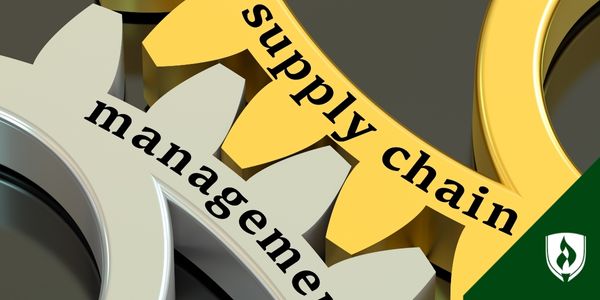11 Things I Wish I Knew Before Starting a Supply Chain Management Career
By Brianna Flavin on 10/26/2023

Many people don't think twice about the supply chain until it breaks.
Disruptions caused by COVID were both complicated and devastating. The entire supply chain felt those impacts, along with consumers who were relying on goods they couldn't receive.
It's a fascinating crash course in the power of supply chain management (SCM). Or at least, if you found it fascinating—a supply chain career might be just what you need.
The puzzle-like, problem-solving nature of a supply chain career can be an addictive challenge for the right mind. The supply chain industry is like a global game of Tetris® getting attacked by weather patterns, politics and disasters every round.
Then again, when you read about a supply chain job description and see “inventory management,” you might not feel that same sense of thrill. It's hard to picture what supply chain professionals do all day.
We enlisted a handful of supply chain management professionals to share about what this industry is really like.
11 Things to know about supply chain management careers
1. It's more exciting than you might think
Perhaps you’ve had jobs where every day dragged on, and you couldn’t wait for the shift to be over. With a career in supply chain management, you can expect every day to be unpredictable—for better or for worse.
“You often serve the role of firefighter as any number of events can create a crisis for those working in supply chain,” says Bryce Bowman, founder of People 1st Advisors. With so many moving parts, even the best supply chain planning goes awry. A plant could go offline for unplanned maintenance or a critical shipment from a vendor could be delayed.
“These events often require you to take immediate action to minimize their impact, and you will have little advance notice.”
A supply chain manager needs to adapt to all circumstances and take action.
“I have operated a machine myself to keep the process moving,” says Mike Wolfe, director of supply chain operations at Delgado Stone Distributors. “When we have a deadline to meet, we make sure we meet it. No one wants to let the team or customer down.”
2. Supply chain management careers are deeply satisfying
Have you ever sat with a complicated puzzle or a tangle of jewelry and felt a sense of calm take over as you focus? If you have, you probably also felt the satisfaction of finishing that puzzle or untangling the knots.
There’s something addicting about taking a heap of chaos and turning it into order.
Supply chain management careers offer that same opportunity. But instead of a completed puzzle, you create pathways of order and flow through the world.
While it can be stressful at times, this aspect of a supply chain management career is awesome, according to Bowman. “Your workday will often look quite different than you had envisioned that morning!” But you probably won't be bored. Supply chain managers tend to find lots of satisfaction in flexing their problem-solving muscles.
3. Supply chain careers go way beyond the movement and storage of goods
A supply chain manager oversees materials, information and finances as the products make their way from supplier to manufacturer, wholesaler, retailer, and finally to consumer. But the responsibilities can vary greatly depending on your industry and organization.
“The thing I wish I had known before I started my career in supply chain management is how diverse the supply chain is,” says Lucas Robinson, chief marketing officer of Crediful. “As if it’s not hard enough to know what area of supply chain you want to work in, every company has a different take on what the supply chain is and which functions are involved in it.”
This means you can find different scopes of responsibility for supply chain management from one employer to another. The supply chain management career path could take you into some really interesting places.
4. Supply chain management is data-driven
Like so many others, a supply chain career will likely rest on lots of data. If you become a supply chain manager, you don't need to be a data analyst necessarily—but you will be up close and personal with those metrics.
“Supply chain is data-intense, and it is important to quickly draw conclusions from large amounts of data,” Bowman says. Since many businesses operate with thousands (or tens of thousands) of unique products, the information load is tremendous.
One of the critical supply chain skills you'll need is the ability to prioritize information.
“You should be agile and able to quickly extract and summarize relevant data in a timely fashion, Bowman says. If you work as a supply chain analyst (or similar supply chain career paths) that data analysis will be a large part of your day.
5. Supply chain management demands people skills
You might be thinking supply chain management sounds very cerebral. And you aren't wrong. But these roles also require collaboration and relationships.
“One thing I wish I had known before beginning my career in supply chain management is that it’s more about being a people person,” says Hew Blair, chairman and buying director of Justerini & Brooks Ltd.
“No supply chain can exist without the teams of professionals who perform the processes and operate all that technology.”
Since working well in groups involves soft skills, anyone considering a supply chain management career should brush up on their communication and collaboration abilities.
“I know many supply chain leaders who began their career after graduation and were initially overwhelmed by the teamwork, leadership and especially customer service skills,” Blair says. Like anything, these skills take practice before they'll become second nature.
6. A broad knowledge base is critical for supply chain management careers
If you picture supply chain management as a series of connect-the-dots involving lots of complex variables for each choice, you might see why extra knowledge about every dot on the board can be a serious asset.
Logistics managers, purchasing managers and even warehouse management positions all benefit from more understanding of the goods or parts you ship and the tools you use. Yoshida suggests brushing up on programming and computer science-related skills where you can. There will be lots of systems to understand.
7. Supply chain management professionals also manage people
You can get into supply chain management with a great head for the logistical aspects of the role. But at a certain point, knowing how to manage other people is just as important—if not more important—than knowing how to manage supply chains.
The ability to develop the relationships you want is an essential ability in SCM, according to James Chong, founder of Top Generator. “As a student, I didn't realize how important delegation would be later on in my life. Being an expert on the low-level technical aspects of this industry can only get you so far, and delegation is critical to reaching the next level in your career.”
8. Supply chain management can be pressure-packed
“SCM is competitive,” Wolfe says. “A mistake or missed deadline can cost a company a few hundred thousand dollars and open the door to a competitor.”
Logistics is a fast-paced, demanding and competitive industry. Wolfe says you should always ask yourself what’s next and how you can take your company to the next step. If you are passionate about what you're doing, you will grow and learn exponentially.
9. You need to network
“Someone once told me, What you know is important; who you know is the key,” says Melissa Patel, CPSM, sourcing and account manager team leader at Field Fastener. “My advice to people moving into this career is that it is all about relationships.” She explains that taking time to meet with suppliers can go a long way.
When you need guidance or a favor, you will have those relationships to fall back on.
“The key is to watch and listen. Ask questions,” Patel says. And look for mentors as well. “Let others who have navigated this career path successfully help you along the paved path.”
10. A great supply chain is environmentally-friendly
When you think of careers that help the earth, supply chain management probably isn’t the first thing you envision. But creating a more efficient supply chain can have a very positive impact on the environment, according to Bowman. “For instance, you might optimize shipments to ensure delivery trucks are fully-loaded, or you may work on projects that result in less wasted product.”
One project in Bowman’s career saved his company over $1 million each year in reduced inventory waste. “Besides generating savings for my employer, we also eliminated tons of waste that would have ended up in landfills.”
11. Supply chain career paths vary
Supply chain management is an umbrella term that includes many different positions. Patel says a typical supply chain career path includes starting as an Expeditor, advancing to become a Buyer and moving upward from there.
Supply chain management internships could also give you a good starting option and the chance to try different aspects of the supply chain management career.
While many strategic roles in the supply chain (like Logistician) typically require a Bachelor's degree, there are tons of different job titles to explore. Other job titles include operations analyst, operations manager, logistics manager, purchasing manager, loading operator, project management, production manager and logistics resource planner.
Be strategic about your future
Supply chain management is a dynamic industry that tends to attract strategic thinkers. “Always think five moves ahead,” Chong says. “Many people get bogged down in their day-to-day tasks and completely miss the bigger picture when it comes to strategizing about their business and their career.”
Now that you have a view of supply chain management, do you have the information you need? Visit the Supply Chain and Logistics Management degree page to get details on how a focused education can help you set the foundation for success in logistics. Also check out our article, "6 Ways Your Warehouse Experience Has Prepared You for a Supply Chain Management Career".
Tetris® is a registered trademark of Tetris Holding, LLC LIMITED LIABILITY COMPANY NEVADA Suite 418 9788 Gilespie Street Las Vegas NEVADA 89183
EDITOR’S NOTE: This article was originally published in February 2015. It has since been updated to include information relevant to 2023.
Related Articles:
- 8 Logistics Skills That Can Help Advance Your Supply Chain Career
- 5 Reasons Why Parents Are Perfect for Supply Chain Management Jobs




